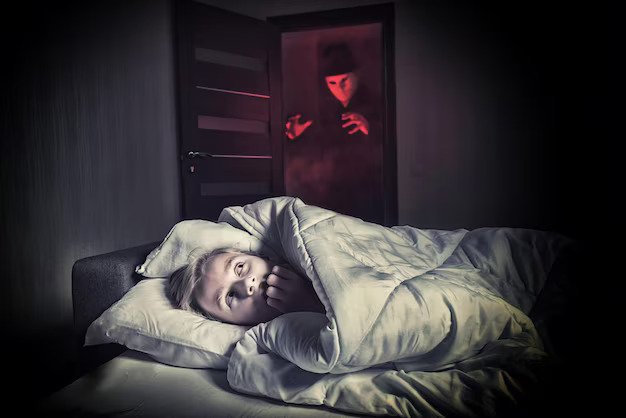Nightmares are intensely realistic and disturbing dreams that usually involve threatening or frightening situations. They often occur in the second half of the night when REM sleep cycles are longer. After a nightmare, many people experience a sudden awakening, an increased heart rate, and difficulty falling back asleep.
Thank you for reading this post, don't forget to subscribe!In children, nightmares are particularly common due to their developing brains and imaginations. For adults, stress, trauma, and lifestyle factors often play a significant role.
Causes of Nightmares
Several factors can trigger nightmares in both children and adults. Some of the most common causes include:
1. Stress and Anxiety
Emotional stress, fear, or ongoing worries can influence dream patterns, leading to nightmares during sleep.
2. Trauma and PTSD
People who have experienced traumatic events may have recurring nightmares, often reliving the distressing situation. This is a common symptom of Post-Traumatic Stress Disorder (PTSD).
3. Sleep Disorders
Conditions such as insomnia, sleep apnea, and restless legs syndrome may increase the likelihood of nightmares.
4. Medications and Substances
Certain antidepressants, blood pressure medicines, or drugs affecting the nervous system can trigger disturbing dreams. Alcohol withdrawal and drug use can also be contributing factors.
5. Illness and Fever
High fever, infections, or illness can sometimes cause vivid and unpleasant dreams.
6. Poor Sleep Hygiene
Irregular sleep schedules, late-night screen time, or consuming caffeine and heavy meals before bed can disrupt sleep, increasing the chance of nightmares.
Effects of Nightmares on Sleep and Health
Nightmares don’t just disturb sleep—they can also affect mental and physical health. Common effects include:
- Sleep disruption: Frequent awakenings during the night.
- Daytime fatigue: Poor concentration, memory issues, and lack of energy.
- Mood disturbances: Irritability, anxiety, or depression.
- Sleep avoidance: Some people may fear going to bed, which can worsen insomnia.
For children, repeated nightmares may cause bedtime resistance, fear of sleeping alone, or frequent waking during the night.
Nightmares vs. Night Terrors
While often confused, nightmares and night terrors are different. Nightmares happen during REM sleep and are remembered upon waking. In contrast, night terrors occur during non-REM sleep, usually in children, and involve sudden screaming, thrashing, or fear without memory of the event.
How to Manage and Reduce Nightmares
If nightmares happen occasionally, they are usually harmless. However, frequent or intense nightmares may require lifestyle changes or professional help. Here are effective tips to reduce nightmares and improve sleep:
1. Practice Relaxation Techniques
Breathing exercises, meditation, or yoga before bed can lower stress and reduce nightmares.
2. Maintain a Healthy Sleep Routine
Going to bed and waking up at the same time each day improves sleep quality and reduces disturbances.
3. Limit Screen Time
Exposure to blue light and disturbing content before bedtime can trigger bad dreams. Turning off screens at least an hour before sleep can help.
4. Create a Calming Sleep Environment
A quiet, dark, and comfortable bedroom promotes deep, restful sleep.
5. Avoid Stimulants
Cut down on caffeine, nicotine, and alcohol, especially in the evening.
6. Journaling or Therapy
Writing down thoughts or working with a therapist may help process stress or trauma that contributes to nightmares.
Also read: What Is A Nightmares In Sleep Causes And Treatments
7. Medical Support
If nightmares are linked to medications or health conditions, consulting a healthcare professional is recommended.
Occasional nightmares are normal, but if they are frequent, severe, or interfere with daily life, professional support may be necessary. Conditions such as nightmare disorder or PTSD-related nightmares can be effectively treated through therapy, medication adjustments, or cognitive behavioral therapy for insomnia (CBT-I).
Nightmares in sleep are unsettling dreams that can affect both rest and daily functioning. While occasional nightmares are common, frequent disturbing dreams may signal underlying stress, trauma, or health issues. By understanding the causes of nightmares, recognizing their impact, and applying effective nightmare management strategies, you can take steps toward better sleep quality and improved mental well-being.
If nightmares persist, don’t hesitate to seek professional guidance. Healthy sleep is essential for both body and mind, and addressing nightmares is an important part of achieving it.



